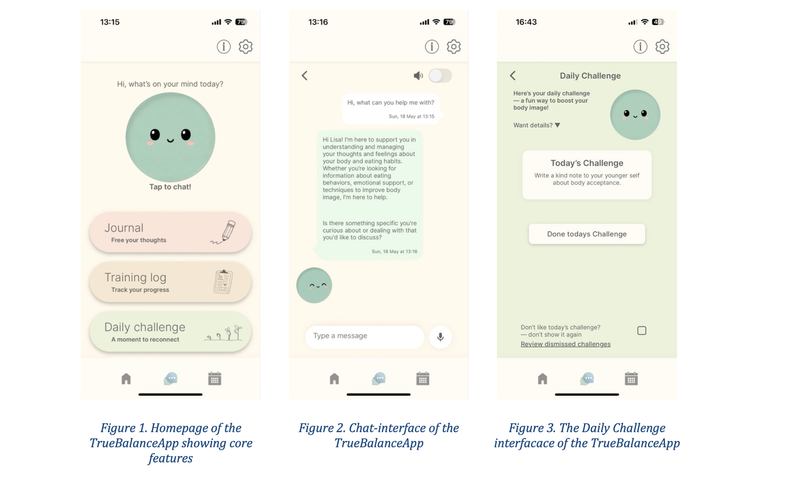Designing a conversational agent for positive body image

Eating disorders and disordered eating behaviours are relatively common among adolescents and young adults, especially young females or elite athletes. The most common treatment of intervention for eating disorders is Cognitive Behavioural Therapy that aims to recognize and change individuals’ thoughts and emotions through conversational guidance. Eating disorders are generally under-diagnosed, because patients tend to hide their symptoms and not seek any treatment. They are also associated with other mental health conditions, such as depression or anxiety.
Current nutrition technologies in the market are focused on tracking nutrition or calory intake, which provides insufficient technology for individuals at a risk of eating disorders. Nutrition applications for tracking calory intake are often inaccurate and can promote unhealthy body image and result in obsessive tracking of calories. A major risk factor for developing eating disorders is body image dissatisfaction, which is influenced by social media, particularly image-based platforms such as Instagram and TikTok. Prior studies show that online activities in social media can significantly impact the prevention and treatment of eating disorders in the clinical context.
This project explores the possibilities and challenges for designing a conversational agent for promoting healthy body image with and for young adults in a risk of eating disorders. The purpose is to develop a dialogue model, grounded in the theories and values of cognitive behavioural therapy, consisting of guided conversational exercises and journaling practices. These should support a healthy body image through elicitation of conversation using topic-based questions. The aim of the model is to identify negative thoughts associated with body image that can maintain unhealthy or obsessive eating habits. In the long-term, this model will aim to incorporate practices from CBT to be used as a therapeutic and self-reflective tool for young adults in a risk of eating disorders, as a compliment to working together with a professional cognitive behavioural therapist.

Research team:
Xuan Zhang, Research Engineer, KTH
Ahmed Zayed, PhD student, KU Leuven, Belgium
Lisa Almstedt, Master student in Sport technology, KTH
Sanna Kuoppamäki, Assistant Professor, KTH
Collaborators and previous students:
Josefin Rehn Hamrin, Master student graduate in Medical Engineering, KTH
Natalia Slusarek, Master student graduate in Interaction Design, KTH
Arzu Guneysu, Lecturer, KTH
Beatrice Vincenci, Digital Futures Postdoctoral Fellow, KTH
Publications:
- Zhang, X., Zayed, A., Hamrin, J. Guneysu, A., Kuoppamäki, S. (2025). Exploring Body Image Awareness With a Large Language Model–Based Conversational Agent: Qualitative Study With Young Adults. Journal of Medical Internet Research. doi: 10.2196/78829
Master thesis:
- Lisa Almstedt (2025). Co-Designing a Mobile Health Application to Promote Positive Body Image Among Athletes: A Mixed Method Study. KTH, School of Engineering Sciences in Chemistry, Biotechnology and Health.
- Josefin Rehn Hamrin (2024). Enhancing Support for Eating Disorders: Developing a Conversational Agent Integrating Biomedical Insights and Cognitive Behavioral Therapy. KTH, School of Engineering Sciences.
- Natalia Slusarek (2024). Designing a conversational agent for young adults in a risk for developing an eating disorder based on Cognitive Behavioural Therapy: Recommendations for Interaction Design. Master’s Programme, ICT Innovations (Human Computer Interaction and Design), KTH.
Presentations and research communication:
- Sanna Kuoppamäki (2024). Facilitating positive body image with young adults through the application of conversational AI. Swedish Workshop on Conversational AI. November 29. Linköping University.
- A New Conversational Tool to Promote Positive Body Image (Blogpost, KTH Digitizing Life, 2024-09-06)